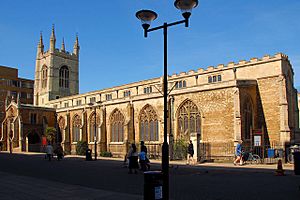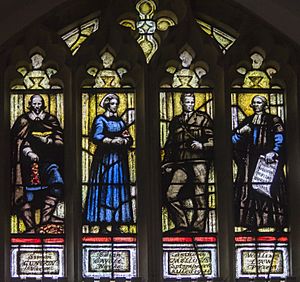St John the Baptist Church, Peterborough facts for kids
Quick facts for kids St John the Baptist Church, Peterborough |
|
|---|---|
| Peterborough Parish Church | |

St John the Baptist Church from Church Street
|
|
| 52°34′22″N 0°14′38″W / 52.5727°N 0.2439°W | |
| Location | Peterborough, Cambridgeshire |
| Country | England |
| Denomination | Church of England |
| Churchmanship | Central |
| History | |
| Dedication | St John the Baptist |
| Architecture | |
| Heritage designation | Grade I listed |
| Designated | 1952 |
| Administration | |
| Parish | St John the Baptist, Peterborough |
| Deanery | Deanery of Peterborough |
| Archdeaconry | Archdeaconry of Oakham |
| Diocese | Diocese of Peterborough |
| Province | Diocese of Canterbury |
St John the Baptist Church is a very old and important church in Peterborough, England. It is a Church of England parish church and is considered a special historic building, known as a Grade I listed building. This means it's protected because of its history and beautiful design.
Contents
Where is St John's Church?
St John the Baptist Church is located in Cathedral Square. It is only a short walk from Peterborough Cathedral. This might seem a bit odd, but it makes sense historically. The Cathedral was mainly for monks, while St John's Church was built for the people living in the town.
The church is officially known as Peterborough's parish church. Its main priest is called the Vicar of Peterborough. There are also other Anglican churches in the city.
A Look Back: History of the Church
How the Church Began
The very first parish church in Peterborough was built in the 11th century. It was located further east than the church you see today. When the town center of Peterborough moved west, the church moved too. Workers carefully took it apart stone by stone and rebuilt it in its current spot.
Building the new church started in 1402. It was officially opened and dedicated to St John the Baptist on June 26, 1407.
Royal Funerals and Bells
In the 16th century, two important royal funerals happened at the nearby Cathedral. These were for Katherine of Aragon in 1536 and Mary, Queen of Scots in 1587. Both queens were buried by the same sexton from St John's, named Robert Scarlett. The bells of St John's Church rang for both of these sad occasions.
Surviving the Civil War
During the English Civil War, in 1651, there was a plan to tear down the church. The Parliament even gave permission to use its stones for other buildings. Luckily, this plan never happened, and the church was saved.
Restorations and Changes
Over the years, the church has been updated several times. In 1819, some old parts were removed, and new features like a clerestory (upper windows) and galleries (balconies) were added.
More major work happened in 1882-1883. An architect named John Loughborough Pearson designed new roofs and other improvements. The galleries were taken out, and the east window was changed. New floors and a new pulpit (where the priest speaks) were also put in. This big restoration cost £11,000 at the time.
In 1938, the church was redecorated in a style called High Anglican. This included a new rood (a cross with figures) and a beautifully painted reredos (a screen behind the altar). The figures were carved by Mahomet Thomas Phillips.
Special Stained-Glass Window
In 1968, a new stained-glass window was installed. It was designed by an artist named Brian Thomas. This window shows important people connected to Peterborough. These include:
- Simon Gunton, who was the vicar during the plague in the 1660s.
- Nurse Edith Cavell, a brave nurse who died in 1915.
- Captain Thomas Mellows, who fought in the French Resistance and died in 1944.
- William Law, who died in 1761.
The window is dedicated to James Ruddle (1830-1898) and his wife Edith. James Ruddle was a well-known local architect.
Why is St John's Church Important?
St John the Baptist Church was given a Grade I heritage listing in 1952. This means it's a very important historical building. It is known as a "prominent and architecturally ambitious parish church." It shows a great example of "Perpendicular town church design."
Experts also noted its "very fine" south porch, a font (a basin for baptisms) from the 15th century, and interesting monuments and tombs inside.
 | James Van Der Zee |
 | Alma Thomas |
 | Ellis Wilson |
 | Margaret Taylor-Burroughs |


